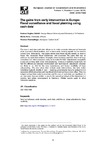The gains from early intervention in Europe: Fiscal surveillance and fiscal planning using cash data

Ver/
Use este enlace para citar
http://hdl.handle.net/2183/23337Coleccións
Metadatos
Mostrar o rexistro completo do ítemTítulo
The gains from early intervention in Europe: Fiscal surveillance and fiscal planning using cash dataData
2012Cita bibliográfica
Hughes Hallett, A., Kuhn, M., & Warmedinger, T. (2012). The gains from early intervention in Europe: Fiscal surveillance and fiscal planning using cash data. European Journal of Government and Economics, 1(1), 44-65. https://doi.org/10.17979/ejge.2012.1.1.4276
Resumo
[Abstract] The use of real-time cash data allows us to make accurate intra-annual forecasts of an economy’s fiscal position, and to issue early warning signals for the need to correct fiscal imbalances. This paper shows how those signals can be used to design the necessary fiscal corrections, and discusses the gains that can be achieved from such interventions. Examples from Germany and Italy show that large corrections are often necessary early on to make adjustments later on acceptable and to keep debt ratios from escalating. There is a credibility issue here; we find the difference between front-loaded and back-loaded adjustment schemes is likely to be vital for the time consistency of fiscal policymaking. We also show that, without early interventions, the later deficit reductions typically double in size – meaning governments become subject to the excessive deficit procedure and significant improve-ment tests more often. Thus the budget savings from early intervention and the use of cash data are significant; in our examples they are similar in size to the operating budget of the department of housing and urban development in Germany. Similar results apply in other Eurozone countries
Palabras chave
Fiscal surveillance
Early warning
Cash data
Additive vs. slope adjustments
Fiscal credibility
Early warning
Cash data
Additive vs. slope adjustments
Fiscal credibility
Versión do editor
Dereitos
Atribución 4.0 España
ISSN
2254-7088






